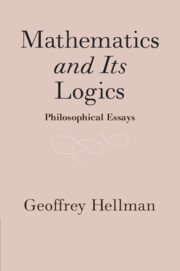Book contents
- Mathematics and Its Logics
- Mathematics and Its Logics
- Copyright page
- Contents
- Acknowledgements
- Introduction
- Part I Structuralism, Extendability, and Nominalism
- Part II Predicative Mathematics and Beyond
- Part III Logics of Mathematics
- 11 Logical Truth by Linguistic Convention
- 12 Never Say “Never”!
- 13 Constructive Mathematics and Quantum Mechanics: Unbounded Operators and the Spectral Theorem
- 14 If “If-Then” Then What?
- 15 Mathematical Pluralism: The Case of Smooth Infinitesimal Analysis
- Index
- References
14 - If “If-Then” Then What?
from Part III - Logics of Mathematics
Published online by Cambridge University Press: 26 January 2021
- Mathematics and Its Logics
- Mathematics and Its Logics
- Copyright page
- Contents
- Acknowledgements
- Introduction
- Part I Structuralism, Extendability, and Nominalism
- Part II Predicative Mathematics and Beyond
- Part III Logics of Mathematics
- 11 Logical Truth by Linguistic Convention
- 12 Never Say “Never”!
- 13 Constructive Mathematics and Quantum Mechanics: Unbounded Operators and the Spectral Theorem
- 14 If “If-Then” Then What?
- 15 Mathematical Pluralism: The Case of Smooth Infinitesimal Analysis
- Index
- References
Summary
The roots of the view of mathematics known as “if-thenism” or “deductivism,” like its near cousins, logicism and formalism, are to be found in the nineteenth and early twentieth centuries’ “new birth” of mathematics. As summarized nicely by Maddy [to appear], this period witnessed a multifaceted transformation from mathematics as investigating formal properties of aspects of material reality, such as space, time, and motion, to its being an exploration of abstract concepts and structures in their own right quite apart from any material applications that they might have.
- Type
- Chapter
- Information
- Mathematics and Its LogicsPhilosophical Essays, pp. 237 - 255Publisher: Cambridge University PressPrint publication year: 2021
References
- 1
- Cited by

